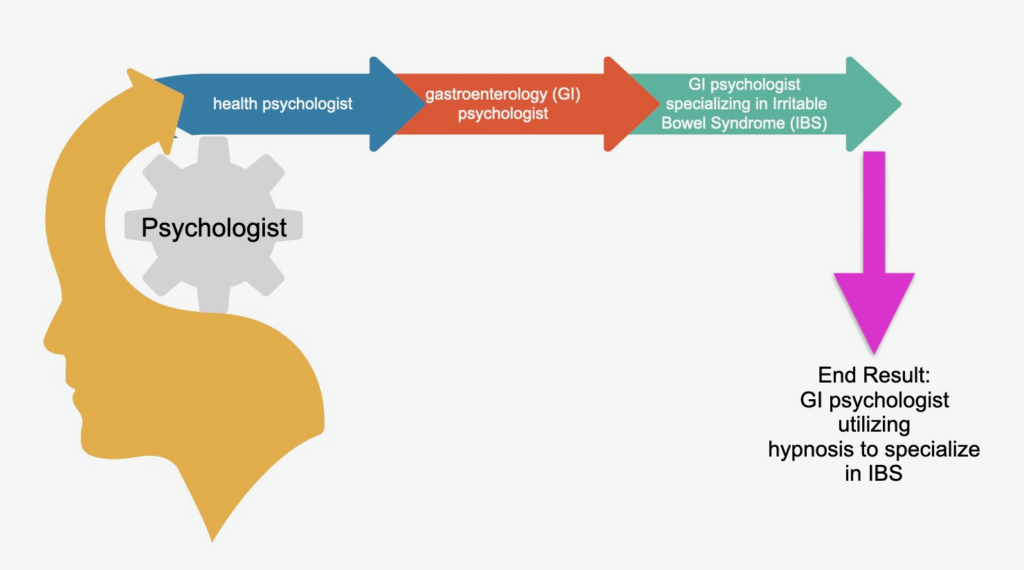When did the world devolve from valuing breadth of knowledge and experience (remember the ‘renaissance man’?) to lauding narrower and narrower specialization in everything we do? In every walk of life – online writing, career trajectories, and even our hobbies – the pressure to niche is palpable. Niching is what the world demands and rewards.
After twenty years serving as a psychologist, business coach, and professor, the whole idea of narrowing disturbs me. There’s nothing wrong with niching if you have that kind of clarity and passion. But most people aren’t prepared to narrow their lives and livelihood to one particular path. And premature niching can be deleterious to creativity, vision, and opportunity.
In fact, resilience itself relies on a breadth of life roles and experiences.
A new world is emerging that recognizes two types of individuals:
- Those who are topic-based and are drawn to others who are highly specialized in their career, writing, and lives and
- Those who are values-based and are drawn to the values, wisdom, wit, or style of others.
Certain fields will always remain highly specialized. I’d prefer to have my hand operated on by a hand surgeon than a general practitioner and I’m sure you would, too. But I’d also prefer that my hand surgeon has a breadth of knowledge about the human condition – including well-developed empathy, intuition, cross-cultural education, communication and even humor. Personally, I’d fire the surgeon who doesn’t have that breadth. Serious errors occur without these qualities. My preferred surgeon actually only seems niched down.
Let’s have a look at the pros and cons of niching and the values-based world I believe we’re galloping toward.
The Upsides to Niching
One of my psychologist friends has been wildly successful niching waaaaay down. She’s had clarity of direction at every step along the way and couldn’t be happier with the results.
This is how her process evolved:

In the field of psychology, we can niche down even further and make a choice between research and clinical (treatment) tracks.
My question is this: Would you have the clarity to niche down this way?
Corollary: Would you want to?
The reality is that it’s easier to succeed if you niche, because:
- You’re only required to have deep knowledge in one area. The narrower your scope, the simpler it is to stay on top of developments in your field.
- When the field becomes this narrow, there’s little competition at the top, and you can quickly establish yourself as the expert in your field.
- Because you’re then the noted authority, clients and organizations can easily identify you as the go-to provider.
Consider my esteemed Qi Gong sensei, Lee Holden. He made a name for himself as the only secular, medical Qi Gong teacher on YouTube who offers a membership for students and a teacher certification program. He shot to the top with this combo.
And in the world of online writing, David Perell took the world by storm with Write of Passage, a course that I rave about like a lunatic. He didn’t offer a writing course. They’re a dime a dozen. He offered an online writing school at a time when no such thing existed.
The Downsides to Niching
The primary downside to niching is that it constrains your focus, throttling creativity and narrowing options. This is especially harmful if you aren’t particularly drawn to a niche and are forcing yourself to do what you believe is required.
To unearth your passion you need to try things. Many things. It’s only by exploring that you bump into the island in the ocean that wasn’t even on your map.
Premature niching is how the people I coach often get trapped in careers and even hobbies that they don’t actually love. They’re successful. So they keep at it, on autopilot. This is how golden handcuffs clink shut.
And, while niching is fine in theory for folks who have already identified their north star, it doesn’t always work out that well in the end. No one would argue that ultra-niched olympiads made a poor career choice. But because their lives are so severely narrowed, they often suffer terribly between seasons and even more so when they exit competition. I wrote about this in The Letdown Lean In: Coping with the Psychological Smackdown After Life’s Big Events. It isn’t pretty.
Narrowing to one role in life can be devastating. A boatload of empirical research has clearly shown that those who sport multiple roles and areas of knowledge in work and life are insulated from the emotional havoc of a changing world. If one role fails, there are many to fall back on. This is how resilience is built.
Turn Down the Noise about Niching to Amp Up Your Value
The insistence on over-specialization is nearing a pivot point. The world is marching toward a very different perspective on what constitutes value.
The arena of online writing serves as an example.
There are two types of readers.
🎯 The topic-based reader wants to know exactly what they’re getting. If you love Harlan Coben and have read fifteen of his books, it’s a sure bet that you’ll want to read a sixteenth. You’ll know what to expect because the books follow a particular formula.
🎇 The values-based reader wants to know exactly who they’re getting. This audience will turn to a writer for their values, their wisdom, their wit, or their style. They read to relate and to feel related to. Breadth of knowledge and perspective serves these readers well, as someone they trust and resonate with is expanding their worldview. Values-based readers will read nearly anything their favorite writer publishes – regardless of the topic – because they are essentially part of the same tribe.
I’m a values-based reader. I find over-focused blogs uninspiring. Of course, if I want to know where the acupuncture points are on the lung meridian or how to clean the screen of my new MacBook Pro, I’ll google that and soak up some info. But I’ll never become a regular reader of that writer’s blog. For me, that’s just boring. And I know I’m not alone.
And yet…I read Louie Bacaj’s blog religiously despite our different interests because reading his work feels like coming home.
The same is true for a career. Some leaders hire people with hyperspecialized niche skills, but that approach is fading fast. The CEOs on my roster all hire people who are broad in knowledge and skills and are equally broad in perspective. They hire great people. Then, they train them to drill down, when necessary, into specializations.
This is the direction the world is moving toward: “Who do we want to spend our time with?” versus “How narrow a person can we find?”
The world is changing, my friends, and so too, are the activities and connections we value.
Planck’s principle applies here:
“A new scientific truth does not triumph by convincing its opponents and making them see the light, but rather because its opponents eventually die and a new generation grows up that is familiar with it.”
– Max Plank
In other words, new ideas don’t advance by evidence, argument, and persuasion, but rather by older thinkers with older ideas passing away. Now, no one’s dying off just yet. But this idea of niching is fading fast. Simply put: The fact that every expert is saying – and has been saying for a long, long time – that you must find your niche doesn’t mean that it’s true. This niche thing’s going to die, as all ideas eventually do.
So before you stuff your square peg into a round hole, consider that by the time you’ve successfully narrowed, the need to do so may be passé.
First Steps Toward a Values-Based World
Several prominent authors are nudging their readers toward a broader life and perspective. We may not be there yet, but they demonstrate that the pivot away from niching has begun.
For instance, in Range: Why Generalists Triumph in a Specialized World, David Epstein states that, “The professed necessity of hyperspecialization forms the core of a vast, successful, and sometimes well-meaning marketing machine, in sports and beyond.” He believes that the industry wizards hawking specialization are the big financial winners in this spiral to the sliver.
Epstein suggests that success actually comes from sampling many areas of interest. He provides countless examples of people who “made it” by following their bliss. Just one example here: The jazz legend Duke Ellington shunned music lessons as a kid to focus on drawing and baseball.
David Perell, the previously mentioned wizard of the online writing world, identifies two types of creators: Architects and Archeologists. This applies equally well to career development.
The Architect “plans a building up front before construction and follows the plan.” The Archaeologist’s approach is different. “…Something unknown is discovered in the ground, and while there may be ideas of what it might be, the approach is to slowly uncover it.” Those who are ‘multipassionate’ or as yet to discover even one passion, can take comfort in their archaeologist tendencies and trust that a direction will eventually emerge, as they sift through the remains.
Both of these perspectives provide the spaciousness to consider who you want to be and how you approach your world. Both are also intuition-based: follow where your heart leads and trust that the dots will connect into a clear picture of your direction.
Epstein promotes the idea of ‘sampling’ that eventually leads to one niche or multiple sequential niches. Perell encourages the archaeologist attitude, trusting that a niche will eventually emerge.
In other words, in some sense, both advisors still support niching…in time. A full pivot will leave niching behind in favor of the broader, values-based self.
Focus on Who You Are, Who You Want to Be, and Who You Want to Attract
“I can choose simply to be prolific, make lots of things, pay attention to resonance and watch in amazement as something else emerges by itself.”
– Michael Ashcroft
Ditch the niche.
Instead, focus on authenticity. Follow your bliss. Or, at least, your interests. Either a niche will emerge organically or you’ll be a values-based versus topical attractor.
You may draw interest like a magnet with a specific topic – especially if you have an unusual perspective on something that interests many people. But it’s your essence that will make people stay, regardless of the topic you’re discussing. And this is true whether you’re writing or job hunting.
There’s a mantra from the world of psychedelic-assisted therapy that I think belongs on every life journey – medicated or not: Trust, let go, be open.
Think of your process as building a cairn. As you stack the aspects of your personality, style, values, and skills one atop another, you build the self you want to be and the audience you want to attract. (See Maymie Chan’s rock stacking 101 for guidance.)
Various specializations can be part of your journey. These will actually expand your skillset and knowledge. I have teaching certifications in mindfulness meditation, trauma-sensitive mindfulness, and hypnotherapy and am now adding Qi Gong and acupressure. Can you see how that broadens, rather than narrows, my credentials and my appeal?
One last thought: If you’re dwelling in a fulfilling niche, by all means, enjoy it. You’ve already stuck the landing. Just continue to give yourself permission to broaden or pivot if that niche stops feeding your soul. Your cairn may look like a pile of sequential niches over the course of your life.





0 Comments